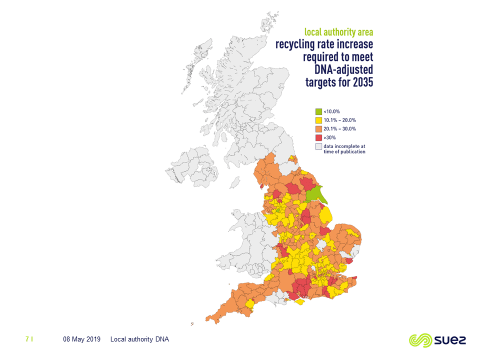The resources and waste strategy: sharing the load
8th May 2019
So we are down to the last few days before the initial four consultations issued to help design the delivery required in the Resources and Waste Strategy for England are due to be submitted. A few organisations will have already submitted their responses, whereas others will be going through their final checks and refinements. At SUEZ, we are working hard to complete our process and are concluding our thinking. We don’t dwell on the detail of the questions anymore, but on how the systems will work together, delivering on government’s goals and equitably sharing the load.
For producers of packaging products the system needs more funding than is currently provided. It needs more alignment of products to make the role of the consumer and waste manager easier and most importantly needs producers’ skills of communication to help the public and business owners achieve the higher levels of engagement and commitment required for success.
For business owners, who are doing much of the future heavy lifting towards the recycling targets, the system needs to help them adjust their procurement styles, to improve the performance of their workforce through workplace changes and communication and finally to make waste minimisation and recycling the habit it needs to be to help us achieve excellence.
For local authorities the challenge is to improve on the systems they currently provide to householders. To help make the changes to accommodate new, more coordinated systems of communication and collection and finally to deliver these changes in a timely manner to try and deliver as much of the targets are possible.
For resource and waste management companies we need to accept the huge changes demanded of us in changing our systems, infrastructure and the way we integrate our services with all the other participants. We have already invested billions of pounds in new infrastructure over the last 10 to 15 years as we moved away from landfill to more recycling and energy recovery for those materials that cannot be recycled. Looking ahead, we have many more billions of pounds to invest to not only complete the current journey, but then deliver the next leg.
Finally consumers, at home, at work and at play need to learn new behaviours, to learn the new systems and to buy differently, demanding products (and packaging) that minimise waste and maximise recycling. Littering and not recycling should be seen as the socially unacceptable behaviour, and producers, retailers, business owners, local authorities and resource and waste management companies need to provide the convenient systems that are required to support these new behaviours.
Although we all need to do our part, the policy drivers also need to target delivery appropriately. For instance when we consider the distribution of load for recycling between local authorities and business owners we see that businesses are tasked with much of the required recycling increase. At SUEZ, although we agree that business waste producers can do much more than they do today, we also believe that the targets set for local authorities could be pushed further. Defra proposes that household recycling moves on average from around 45% to 55%, whereas business recycling moves from 35% to 75%. From work we have done over the last 18 months, we believe that household recycling could get to an average of 62%, but this needs a rational distribution of load between authorities and more particularly a reduction in the volume of residual waste produced. Using what we call local authority DNAs to help set appropriate individual targets and by pushing waste minimisation through constraints on the volume or weight of residual waste we believe municipal recycling can deliver more than currently proposed. We have modelled this for most English authorities and presented below is what we believe is possible and equitable and matches a bit more an even distribution of load. If the local authorities in this map met these differential targets, then England could proportionally match what has already been achieved in Wales.

Local authority DNA
So whilst putting the final touches to your submission, don’t get bogged down only with details and your own perspective, but think about the bigger picture, achieving the long term goals and what is the best solution for the country as a whole.
Tweet- behavioural change
- circular economy
- council services
- Defra
- environmental solutions
- EPR
- Extended Producer Responsibility
- Government
- recycling
